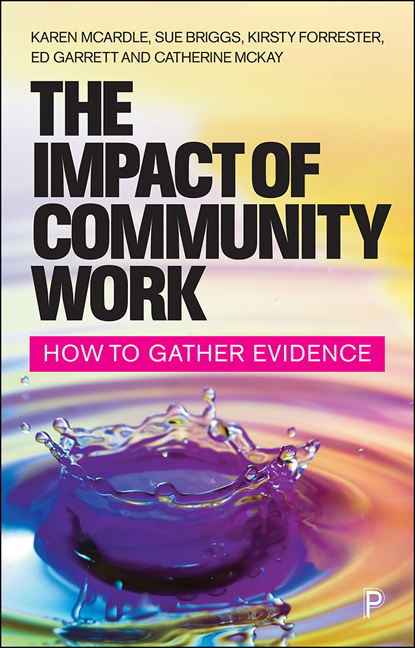2 - Power, Empowerment, Impact and Voice
Published online by Cambridge University Press: 10 March 2021
Summary
Introduction
In this chapter, we discuss the importance of values and the link to power and empowerment that is a purpose central to work in the community in democratic countries. We discuss voice, which is making the perspectives of the people with whom we work heard by ourselves and by others. We also introduce ethical choices, which must be applied to our activities linked to gathering evidence. We return to ethics frequently in this text, as we think ethics are fundamental to the processes of gathering evidence because they govern how it ‘should’ be done and the ‘right’ way of doing these processes.
What is right in terms of what we do in community work and in gathering evidence is linked to morality and the following questions:
Why we do what we do?
How we do what we do?
How does this link to ideas about self and others?
Morals, as Driver (2007) explains, comprise those things one ‘ought’ to do. Moral norms, with which this book is concerned, primarily, as Driver explains, concern our interactions with others in ways that have significance to the latter's wellbeing. If we do something that could harm or benefit others, Driver explains, this is arguably a moral matter.
There are many examples of ways in which things have been done that are linked to what most people consider to be atrocities. We can perhaps all agree that genocide is not acceptable, but many of our choices of what to do in community work are less clear-cut. Beneficence is a useful term – it means we do what is in the best interests of humanity – but we then have to struggle with the question of who decides what is best. In community work, we often make judgements about what is in the best interests of a community, which puts us in a very powerful position. It is important to work in the community that we are clear about why we do what we do and how we choose to do it, as it affects others and those effects can be good or bad.
Self-knowledge is important in community work so we can be clear about what we do and why. Reflexivity is also important; it may be linked to reflection and critical reflection.
- Type
- Chapter
- Information
- The Impact of Community WorkHow to Gather Evidence, pp. 29 - 50Publisher: Bristol University PressPrint publication year: 2020



